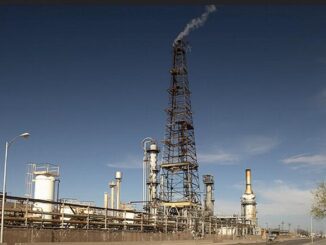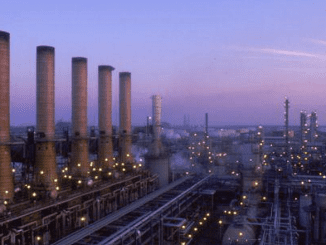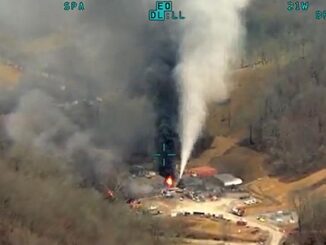HAHNVILLE, Louisiana, February 18, 2021 (ENS) – Thousands of tons of air pollution emitted in flares by four manufacturing facilities in Texas and Louisiana will be reduced under a settlement reached by the companies in January with the U.S. Department of Justice, the U.S. Environmental Protection Agency, EPA, and the Louisiana Department of Environmental Quality.
The settlement resolves allegations that Dow Chemical Company and two of its subsidiaries, Performance Materials NA Inc. and Union Carbide Corporation, produced a surplus of toxic air pollution while violating the Clean Air Act by failing to keep an eye on petrochemical flares at their facilities and operate them in accord with guidelines that ensure toxic air pollutants are rendered less harmful.

Flares burn off waste gases that would otherwise be released into the atmosphere during some industrial operations. Well-operated flares should have high “combustions efficiency,” meaning that they combust nearly all harmful waste gas constituents, like VOCs and hazardous air pollutants, and turn them into water and carbon dioxide.
The complaint filed by federal and state governments alleges that Dow and its subsidiaries “oversteamed” their flares and failed to comply with other key operating parameters that ensure the volatile organic compounds, VOCs, and other hazardous air pollutants contained in the gases routed to the flares are effectively combusted.
The air pollutants addressed by the settlement are a serious public health threat. VOCs are a key component in the formation of smog or ground-level ozone, a pollutant that irritates the lungs, aggravates diseases such as asthma, and can increase susceptibility to respiratory illnesses, such as COVID-19, pneumonia and bronchitis.
Chronic exposure to benzene, which EPA classifies as a carcinogen, can cause numerous health impacts, including leukemia and adverse reproductive effects in women. As part of the settlement, Dow will perform air quality monitoring that is designed to detect the presence of benzene at the fence lines of the four covered plants and pay a civil penalty of $3 million.
Together, the companies will invest a total of $294 million to set up technology to control the excess air pollution from 26 industrial flares at four of the company’s locations: Hahnville, Louisiana; Plaquemine, Louisiana; Freeport, Texas; and Orange, Texas.
The agreement is designed to improve Dow’s flaring practices. First, it requires Dow to minimize the amount of waste gas that is sent to the flares, which reduces the amount of flaring. Second, Dow must improve the combustion efficiency of its flares when flaring is necessary.

In order to minimize the waste gas sent to the flares at each facility, Dow will operate flare gas recovery systems that recover and “recycle” the gases instead of sending them to be combusted in a flare. The flare gas recovery systems will allow Dow to reuse these gases as a fuel at its facilities or as a product for sale.
Dow also will create waste minimization plans for each facility to further reduce flaring.
For flaring that must occur, the agreement requires that Dow install and operate instruments and monitoring systems to ensure that the gases sent to its flares are efficiently combusted.
Once the technology is functioning, the toxic volatile organic compounds, VOCs, in the air will be reduced by over 5,600 tons every year.
The settlement will also help to remove other air toxins, like benzene, which will also be removed by nearly 500 tons every year.
“This settlement will improve air quality in Texas and Louisiana by eliminating thousands of tons of harmful air pollution each year,” said Jonathan Brightbill, the acting assistant attorney general of the Justice Department’s Environment and Natural Resources Division.
“The Clean Air Act provides a blueprint for the industry to operate in a safe and controlled fashion,” said Dr. Chuck Carr Brown, Louisiana Department of Environmental Quality, LDEQ, Secretary. “LDEQ will continue to work with our federal partners, EPA and the Justice Department, to finalize agreements that settle both long- and short-term compliance issues. Every citizen of Louisiana will benefit from the Beneficial Environmental Project portion of the settlement.”
Copyright Environment News Service (ENS) 2021. All rights reserved.



